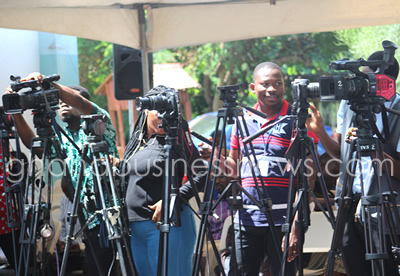Ghana described as partly free in press freedom report
 In its 2017 Freedom of the Press report, Washington based Freedom House describes Ghana’s status as partly free, same as in 2016. In an overall score of 100, Ghana scored 33. The countries were assessed under Legal Environment – 30 points and Ghana scored 9 points; Under Political Environment, Ghana got 13 out of 40 points and 11 points under Economic Environment which makes up 30 points of the overall score, giving Ghana 33 out of 100 points.
In its 2017 Freedom of the Press report, Washington based Freedom House describes Ghana’s status as partly free, same as in 2016. In an overall score of 100, Ghana scored 33. The countries were assessed under Legal Environment – 30 points and Ghana scored 9 points; Under Political Environment, Ghana got 13 out of 40 points and 11 points under Economic Environment which makes up 30 points of the overall score, giving Ghana 33 out of 100 points.
The report covering 199 countries of the world was released last week.
According to Freedom House, it assesses media freedom using common criteria for all settings, in poor and rich countries as well as in countries of varying ethnic, religious, and cultural backgrounds.
The organization says it assesses the countries on Article 19 of the Universal Declaration of Human Rights, which states:
“Everyone has the right to freedom of opinion and expression; this right includes freedom to hold opinions without interference and to seek, receive, and impart information and ideas through any media regardless of frontiers.
All states, from the most democratic to the most authoritarian, are committed to this doctrine through the UN system; to deny it is to deny the universality of basic human rights. While cultural distinctions or economic underdevelopment may affect the character or volume of news flows within a country or territory, these and other differences are not acceptable explanations for infringements such as centralized control of the content of news and information.”
It noted that of the 199 countries and territories assessed for 2016, a total of 61 (31 per cent) were rated Free, 72 (36 per cent) were rated Partly Free, and 66 (33 per cent) were rated Not Free.
“This balance marks a slight shift toward the Partly Free category compared with the edition covering 2015, which featured 62 Free, 71 Partly Free, and 66 Not Free countries and territories,” it said.
According to Freedom House, there were three status changes in Freedom of the Press 2017: Afghanistan improved from Not Free to Partly Free, the Maldives declined from Partly Free to Not Free, and Poland declined from Free to Partly Free.
The report found that 13 per cent of the world’s inhabitants lived in countries with a Free press, while 42 per cent had a Partly Free press and 45 per cent lived in Not Free environments, it said.
It noted also that the population figures are significantly affected by two countries—China, with a Not Free status, and India, with a Partly Free status—that together account for over a third of the world’s population.
“The percentage of those enjoying a Free media in 2016 remained at its lowest level since 1996, when Freedom House began incorporating population data into the findings of the report,” it said.
In a press release, Freedom House pointed out that global press freedom has declined to its lowest point in 13 years in 2016 due to unprecedented threats to journalists and media outlets in major democracies, intensified crackdowns by authoritarian states, and moves by Russia and China to increase their influence beyond their borders.
Jennifer Dunham, the director of research for Freedom of the Press, was quoted as saying,“Political leaders and other partisan forces in many democracies—including the United States, Poland, the Philippines, and South Africa—attacked the credibility of independent media and fact-based journalism, rejecting the traditional watchdog role of the press in free societies.”
Commenting on the report, Michael J. Abramowitz, the president of Freedom House, said, “The fierce attacks we have seen on factual reporting pose a danger to freedom of the press around the world.”
“When politicians lambaste the media, it encourages their counterparts abroad to do the same. Vitriolic attacks on individual journalists and news outlets in the United States undermine our democracy’s status as a model of press freedom,” he added.
The report indicated that some of the steepest declines on the report’s 100-point scale occurred in Poland, Turkey, and Hungary.
“The deterioration in Hungary and Turkey has continued for several years, but the sharp drop in Poland is a new and alarming development,” it said.
It however, noted that there were a few positive developments during the year, as governments in Afghanistan, Argentina, Panama, and Sri Lanka moved to improve media environments that had suffered under their predecessors.
“However, the practical effects of many of these improvements remain to be seen,” Freedom House said.
By Emmanuel K. Dogbevi
Copyright © 2017 by Creative Imaginations Publicity
All rights reserved. This news item or any portion thereof may not be reproduced or used in any manner whatsoever without the express written permission of the publisher except for the use of brief quotations in reviews.
